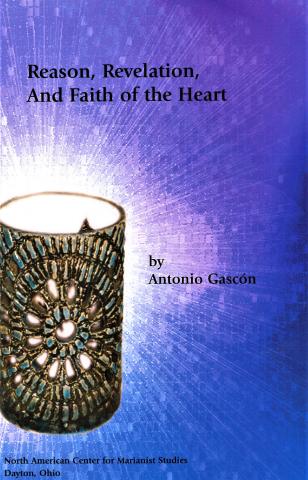by Antonio Gascón, SM
Translated by Thomas A. Thompson, SM
233 pgs.
Monograph #54
This is the English version of Father Gascón's spiritual and theological biography of Blessed William Joseph Chaminade, Defender y proponer la Fe en la enseñanza de Guillermo José Chaminade. This book may serve as a companion volume to Chaminade's Writings on Faith, published in 2005.
Father Gascón describes from the atmosphere of renewal in France and the missionary nature of Father Chaminade's work to rechristianize France. He then considers writings of others who had influenced Father Chaminade's thought: 19th century Catholic apologists, members of the French School, and the apologists of reason. Gascón presents many selections from Writings on Faith–to Mlle de Lamourous, the Sodalities, the religious orders, and the expanding foundations. The final section surveys the development of Father Chaminade's thought on faith over many years and his distinct contribution: to show that the heart, longing for completion and happiness and enlightened by divine revelation, may guide the intelligence toward the consent of faith. Chaminade wished to bring his followers to a free and deeply personal decision to adhere to God's truth through love. He developed a method to allow the revealed truths, the doctrines of faith, to provide the norms of conduct for daily life and prayer. This approach influenced all the human faculties of hoping, loving, deciding, and acting. Borrowing from St. Paul, Chaminade termed this approach "faith of the heart."
This faith, which opens us to the knowledge of the God of our salvation, participates in the divine nature of God. We could not know God if God did not endow our knowledge and our will. So from the divine point of view, faith is the gift of God, a certain participation in the divine life.
Faith binds us in a way with God; it brings us into communication with God, merges our spirit with his Spirit, our heart with his heart. The light of his Spirit passes into ours; we see things only as God sees them; we judge them as God himself judges them; gradually our prejudices are scattered; we become adept at the science of God himself."
By the divine nature as its object, the knowledge of faith produces the divinization within the knowing subject. We know God through a certain divinizing knowledge. Meanwhile, from the human point of view, referring to the two natural faculties, the intelligence and the will, faith is "as necessary as a light which illumines [our souls]. Considered with respect to our wills, it is a pious affection which inclines the soul to obey the light which illumines it."
In this definition of faith, understood as a transformation and a certain adaptation of our intellect to the divine intellect, we have an introduction to the mystical and divinizing nature of faith described by St. Thomas. But above all, by defining faith as a "holy desire," St. Thomas gave to the will a primacy in the act of believing. In the context of rationalism, Chaminade knew the difficulty of establishing an assent of faith based simply on an act of reason. Making use of the Thomistic notion of "holy desire," he situated faith in the will; however, later he had to defend the nature of faith and explain its relationship to reason.

